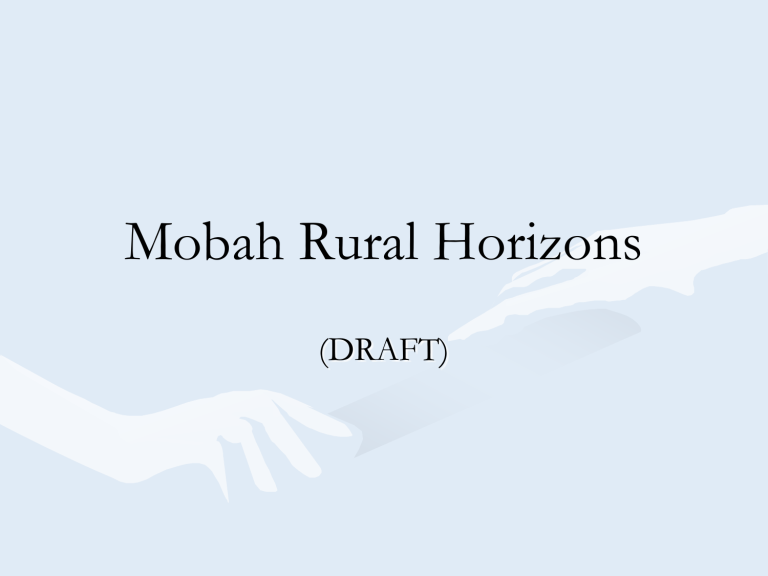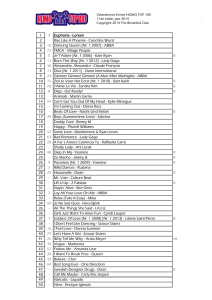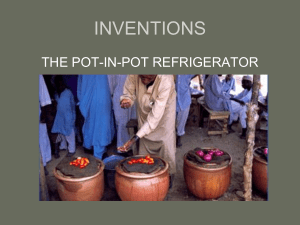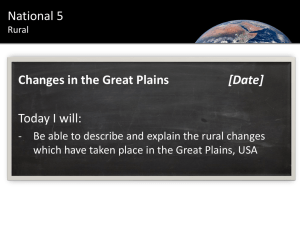Mobah Rural Horizons (July 6) (2)

Mobah Rural Horizons
(DRAFT)
On the real condition of the majority of northern Nigeria’s rural poor:
I saw the agony and helplessness of the people who produce what was not enough to sustain them yet, lose them as they spoil. I discovered that their major problem was their inability to store the crops (particularly the perishable ones) they have produced which made them to sell at give away prices to avoid their spoiling. I saw girls who ought to be in school hawk food and perishable farm products around communities. At times, when they have nobody to buy them, they spoil and still have to live with the odour and the health effects. After much agonizing, I thought of and found a way out to help these people. My vision of what I could do is the mission of Mobah Rural Horizons.”
–Mohammed Bah Abba, Founder and CEO of Mobah Rural Horizons.
(Oluwasolo, 2011)
As suggested in the opening , Mobah Rural Horizons emerged as a response to painful social and economic conditions which hampered rural development in northern Nigeria at the beginning of the new millenium. For instance:
– 81% of rural households did not have access to electricity and, by extension, modern refrigeration. (Oluwasolo, 2011)
– The few roads that could link farmers to urban markets were reported to be in deplorable conditions. (Ibid)
– Farmers were eager to sell their products at a cheap price because their food would easily spoil. This meant they earned reduced earnings. (Ibid)
– According to research by the International Food Policy Research
Institute, over half (54%) of rural households continued to live in poverty
(ie, they could not afford a basic basket of goods) in 2004. When looking at Northern Nigeria, in particular, this number jumped to over 60%
(Omonona, 2010).
Established in 2001, Mobah Rural Horizons is a for-profit
[organization] which relies on local resources to develop and distribute valuable technology for rural development.
Mallam (Scholar) Mohammed Bah Abba.
– He was born in 1964 and raised into a family of pot makers in Northern Nigeria.
– He studied biology, chemistry, and geology, before becoming a lecturer in business studies at Jigawa State Polytechnic in Dutse,
Nigeria in 1990. He then became a regional consultant for the UNDP in Northern
Nigeria, responsible for evaluating and monitoring microcredit to rural workers.
– His work with the northern, rural population gave him first-hand exposure to the economic and social hardship and decline that grew out of rural poverty. It led him to ask “How can I help?” and to identify food spoilage as a key contributor to poverty.
– From 1995-1997, he began testing an idea to use evaporative cooling and his grandmother’s earthenware pottery to refrigerate foods in the desert climate.
– His tests revealed that fruits and vegetables such as eggplants were preserved for up to 10 times longer. This was the first evidence of success of his highly regarded invention, the zeer, also known as the pot-in-pot refrigerator or desert cooler.
(Rolex Awards, 2005; Worldaware, n.d.; Ashoka, 2008)
Mohammed Bah Abba paid out-of-pocket for much of the early marketing, production and distribution of the zeers with some additional support from the
UNDP, the regional government, a local women’s development group, and his brother. He distributed 5,000 zeers for free during his first distribution campaign and later supplied another dozen local villages with 7,000 zeers, again at his expense. (Rolex Awards, 2005).
With successful trial runs and marketing, he established Mobah Rural Horizons the next year in Kano, Nigeria.
Images taken from: http://www.jumpjet.info/E mergency-
Preparedness/Emergency-
Supplies/Zeer_Pot.pdf
. See
Final Slide (Technical
Information Links).
How the Zeer Works
As the moisture separating the pots evaporates, the temperature drops in accordance with the physical process known as evaporative cooling.
(For more details on the physical process, see links on technical information section of
References.)
Since the beginning, Mobah Rural Horizons has been about mobilizing local ressources and local energy.
– By revitalizing the use of traditional earthenware pottery which had been brought to near extinction by the widespread use of aluminum containers and other contemporary products.
– By employing skilled pot makers and local labour to produce the pots.
– By spreading technology to rural women (see next slide).
– By using local entertainers during the initial marketing campaign: Abba devised an educational campaign tailored to village life and the illiterate population, featuring a video-recorded play by local actors who dramatise the benefits of the desert refrigerator. Abba began showing the video in villages using a makeshift cloth screen and a portable projector and generator. "Nightfall is best," he comments, "because this is when farmers head home and are keen to watch an entertaining presentation."
(Rolex Awards, 2005)
The success of these activities affirm Abba’s conviction that the ressources in
Northern Nigeria could be mobilized to help generate and spread rural development.
Despite elements of hardline patriarchy in northern Nigeria, Abba has also worked to expand the technology and practice to women in northern Nigeria.
From Worldaware: “One of his aims is to improve the situation of married women who, traditionally, cannot leave their village. He runs education centres for them and has found that his desert coolers help them earn the money to buy soap and other things they need.”
(Worldaware, n.d.)
Mobah Rural Horizons is responsible for several impressive achievements.
Production
By spring 2005, over 90,000 zeers were sold.
Mobah Rural Horizons now sells around
30,000 coolers a year to farmers and others who seek to preserve food cheaply (Rolex
Awards, 2005; Ayllu & CSTS, n.d.).
Awards for the invention of the zeer and the work of Mobah Rural Horizons include:
– 2000: Rolex Awards
– 2006: Tech Museum of Innovation
Award
– 2007: Santa Clara Global Social Benefit
Incubator
– Inclusion in TIME’s best inventions of
2001 list.
(Ayllu & CSTS, n.d.; TIME, 2001)
Food Preservation
The freshness of most produce is extended by 5 to 10 times thanks to the
Zeer
– Tomatoes: 2 days – 20
– Guavas: 2 days – 20
– Okra: 4 days – 17
– Carrots: 4 days – 20
(Node Africa, 2010)
Negative health effects due to the prevalence of rotting or moderately spoiled food has also been reduced.
Spread of the Technology
Darfuri women training to produce Zeers (Practical
Action, n.d.) The technology has expanded into Sudan with the support of Practical
Action and local groups.
It has also reached
Cameroon, Chad, Niger,
Ethiopia, and Eritrea
(Tech Museum, 2011).
Earnings and Local Economy
Because vegetables are preserved for longer farmers no longer have to rush as before and can sell to demand. In the case of Darfur, they can make an additional 25-30% income (Node
Africa, 2010). Money is also saved in that unsold food can be consumed as opposed to thrown away. Mobah has also provided employment and new local industry for potmakers.
Education
Abba notes that because girls no longer have to hawk perishable foods “they are now free to attend school and the number of girls enrolling in village primary schools is rising”
(Rolex Awards, 2005 and Oluwasolo, 2011).
Taken together, the improvements depicted can be seen as an outgrowth of Abba’s belief that our purpose is to make good use of the tools given to us by improving the lives of others:
“I felt we all have obligations to mankind at large which are not in consequence to any special voluntary pact, but rather they arise from the relationships of man-to-man and man-to-God.”
- Mohammed Bah Abba (Social Edge, 2007).
For those farmers who rely on their crops for subsistence and income, and who have no other means of refrigeration, the power and value of the invention is apparent. More generally the case demonstrates that local ingenuity and social entrepreneurship, even with minimal recognition or funding in the formative period, can help alleviate poverty even in difficult, stateless environments.
“For a country like Nigeria which has over 140 million people, government can not be the sole provider of everything. So people have to act and act very fast and think of other ways and means through which people can survive. Traditional initiatives, cultural initiatives will help as well, of which the pot-in-pot is one and helping.”
- Mohammed Bah Abba (Rolex Awards, 2005a).
References
Ashoka: Innovators for the Public. (2008). Mohammed Bah Abba. Last Retrieved July 6,
2012 from http://www.ashoka.org/fellow/mohammed-bah-abba .
Ayllu Initiative and Centre for Science, Technology, and Society at Santa Clara University
(Ayllu & CSTS). (n.d.). Mobah Rural Horizons: A Power-Free Rural Pot-in-pot Refrigeration
System. Last Retrieve July 6, 2012 from http://energymap-scu.org/mobah-ruralhorizons/ . Rolex Awards. (2005). Mohammed Bah Abba. Rolex Awards for Enterprise.
Last Retrieved July 6, 2012 from http://www.rolexawards.com/profiles/laureates/mohammed_bah_abba/project .
Development of a low-cost cooler to preserve perishable foods in countries with arid climates (n.d.) Food
Chain Magazine. Retrieved July 6, 2012 from http://www.jumpjet.info/Emergency-
Preparedness/Emergency-Supplies/Zeer_Pot.pdf
.
Node Africa. (2010). Mohammed Bah Abba Brings Fresh Change with the Zeer Pot (Nigeria). Last
Retrieved July 6, 2012 from http://nodeafrica.visualsociety.com/fresh-change-withthe-zeer-pot-nigeria/
Omonona, B. (2010). Quantitative Analysis of Rural Poverty in Nigeria. International Food and
Policy Research Institute (IFPRI). Last Retrieved July 6, 2012 from http://www.ifpri.org/sites/default/files/publications/nssppb17.pdf
Oluwasolo, O. (2011). Pot-in-pot Enterprise: Fridge for the Poor. United Nations Development
Programme. Last Retrieved July 6, 2012 from http://growinginclusivemarkets.org/media/cases/Nigeria_PotInPot_2011.pdf.
Practical Action. (n.d.) The Clay Refrigerator. Last retrieved July 6, 2012 from http://practicalaction.org/docs/region_sudan/clay-based-technology-refrigerator.pdf
References (cont…)
Rolex Awards. (2005a). Mohammed Bah Abba – Overview [Video file]. Last
Retrieved July 6, 2012 from http://www.rolexawards.com/profiles/laureates/mohammed_bah_abba/ove rview .
Social Edge. (2007, December 19). Mohammed Abba – Nigeria [Video File].
Last Retrieved July 6, 2012 from http://www.youtube.com/watch?v=z9zKghNEu3M&feature=related .
Tech Museum. (2011, August 18). Mohammed Bah Abba [Video File]. Last
Retrieved July 6, 2012 from Youtube video http://www.youtube.com/watch?v=wZCcfci2y1U .
TIME. (2001). Best Inventions of 2001. Last Retrieved on July 6, 2012 from http://www.time.com/time/specials/packages/article/0,28804,1936165_193
6254_1936632,00.html
Worldaware. (n.d.) The Shell Award for Sustainable Development – The Winner: Mobah
Rural Horizons. Last Retrieved July 6, 2012 from http://www.worldaware.org.uk/awards/awards2001/mobah.html
.








